|
On the road from Qazaax (Azeri Olympic Village) to Sheki
.
. . . . Sheki, Azerbaijan By: Kambiz Taleghani 20080710 Stopped
at the mountain town of Sheki in northern Azerbaijan on our way to Baku. This mountainous town is
about 360 Kilometers (230 miles) West of Baku in Qafqaz (Caucasus) mountains. North of the main road connecting Tbilisi and
Baku. Summer vacation spot for most Azeris who want to escape from the heat of their southlands. Sheki’s origins go back to 2500 years. This was once
part of Iran and a center of Zoroastrian Persian empire. More recently, 1700-1800s, Sheki was the seat
of old Azeri royalty. Sheki was center of many crafts and Artisans. To this day, you can find a silk
factory, carpet-weaving shops, and fine artisans hand-fabricating beautiful doors and windows with their intricate woodwork
and colourfull glass inlays. We stopped at one workshop and observed the master at work.
He was nice enough to let Leila try her hands at laying a few of the glass pieces in the lattice works as the master
laid the small pieces of wood.  No glues! In fact they built the Khan’s palaces in the1800s without use of any
nails. No glues! In fact they built the Khan’s palaces in the1800s without use of any
nails. Because of its pleasant surroundings and artisans, Sheki had five large caravanserais
until the 1800s, catering to the Silk Road caravans that stopped here. It still has one caravanserai
left. Silk Road caravans stopped here. Sheki’s history goes back
a few thousand years.  One day, we asked for a local guide who spoke English.
A nice young gentleman came and introduced himself. Zulfaqaar is actually an English teacher at
the University who lives behind the mountain to the north of the city. In speaking with him, we were amazed
that, until recently, how little the school children were taught about their own history, culture, and background.
Almost a vacuum. All had to go through a state-approved curriculum dictated by Moscow and approved
by the Communist party. Visited an old Alban church from the First Century.
That makes it, what, within a 100 years after the birth of Christ! Very interesting.
See pictures.  Prior to being a church the structure was the site of a “pagan” place of worship. Pagan could
mean Zoroastrianism, for that was the prominent religion of the time at this place. Do you suppose present-day
Albania gets its name from this area? Apparently Sheki was part of Albania. The church
was started by the Apostle St. Elise. Today’s Albania is a Moslem country. Interesting
that their ancestors started Christianity in what is today another country – Azerbaijan. What
is also interesting is that present-day Azerbaijan was, at that time, the center of Zoroastrian religion! How
times change. Today’s Azerbaijan has no state religion and is a secular country.
Although not extensively practiced, most people, if asked, consider themselves Moslem. Prior to being a church the structure was the site of a “pagan” place of worship. Pagan could
mean Zoroastrianism, for that was the prominent religion of the time at this place. Do you suppose present-day
Albania gets its name from this area? Apparently Sheki was part of Albania. The church
was started by the Apostle St. Elise. Today’s Albania is a Moslem country. Interesting
that their ancestors started Christianity in what is today another country – Azerbaijan. What
is also interesting is that present-day Azerbaijan was, at that time, the center of Zoroastrian religion! How
times change. Today’s Azerbaijan has no state religion and is a secular country.
Although not extensively practiced, most people, if asked, consider themselves Moslem.

I wonder what the future travelers will observe in another few hundred
years.
Visited
the old Palace of the Sheki kings. The Soviets demolished much of the facility. Of
the 40 buildings only one remains. Such a beautiful palace.  
In one room there used to be a Tabriz Persian carpet.
 The exact image of the carpet was painted on the ceiling, to imitate the reflection of a mirror.
The carpet is gone. The reflection remains! The exact image of the carpet was painted on the ceiling, to imitate the reflection of a mirror.
The carpet is gone. The reflection remains!
 Did I mention that no nails were used in the construction of the palace? Too bad that all but one structure
was demolished during the Soviets. Did I mention that no nails were used in the construction of the palace? Too bad that all but one structure
was demolished during the Soviets.

Outside the palace walls there was an old Qazzaax gentleman with his traditional dress
AND a stuffed mangy wolf, hidden under the cover of a sheet. For a few Manats ($2-$3), he would remove
the cover for you to see and photograph the animal. He had wired the poor animal’s eye sockets with
two light bulbs. For another one Manat, he would enlighten the visual effect by flickering the lights
(sorry, eyes) on-and-off by manually flipping a battery-operated switch inside the cavity of the skin. Depending
on your capacity to watch such a spectacle, it could be amusing, very funny, or … well, some people could not look! Sheki
is also a silk center for Azerbaijan. That means an abundance of mulberry trees for the silkworms to feed
on the leaves. Visited a silk factory. Very expensive. Leila and
Adriana bought a silk carpet loom with a partially-finished carpet on it. 
We also visited 2-3 museums in the area. Not many visitors.
Remember, this is not exactly the tourism center of the universe! What is so funny,
I noticed some unusual familiarity with the guides and attendants, until it was noted that, yes indeed, these were the same
exact guides and attendants we saw at the last museum across the way! They were rushing ahead
of us to open and operate the next museum on our itinerary! I was so tempted to speak loudly and say let’s
go back to the last one for I forgot to see one of the exhibits! … and then come back again! (My
wife thought that was mean thinking. I don’t know: It could be a funny scene with
them running ahead of us back-and-forth across the street from one museum to the other as we kept changing our minds!)
We saw many music schools. I heard that Sheki ranks very high in
the number of music schools. Supposed to have the highest number of music school per capita in the world!
I wonder if it is even actually more than Salzburg, Austria. Mozart would be curious. Nice
tree-lined streets. Visited a “nature park” at the base of the mountain.
 Leila tried a paddle boat on a pond which is fed by spring water. There were a number of Azeri men singing absolutely
beautiful songs with a number of percussion instruments. Very loud. Extremely lively.
They seemed to be enjoying themselves tremendously. Lots of laughter. (We
noticed the same in China a month later at the Ming summer palace in Beijing. I caught a few seconds of
the latter on video). I hurried to record a video/audio of their impromptu performance, but by the time
I located the source of the sound through the trees, they finished and each went his own way. What a shame.
I wish you could have heard their singing. So lively and beautiful. Fast
beat. I can’t even remember the tune nor repeat the melody any longer, but do remember the feeling
of elation at listening to them. What a pleasant experience. I am glad we were
there to hear that. I have to remember to check for the music of the area when we get back to Los Angeles.
Thinking back, with music schools there, it should have come as no surprise. Leila tried a paddle boat on a pond which is fed by spring water. There were a number of Azeri men singing absolutely
beautiful songs with a number of percussion instruments. Very loud. Extremely lively.
They seemed to be enjoying themselves tremendously. Lots of laughter. (We
noticed the same in China a month later at the Ming summer palace in Beijing. I caught a few seconds of
the latter on video). I hurried to record a video/audio of their impromptu performance, but by the time
I located the source of the sound through the trees, they finished and each went his own way. What a shame.
I wish you could have heard their singing. So lively and beautiful. Fast
beat. I can’t even remember the tune nor repeat the melody any longer, but do remember the feeling
of elation at listening to them. What a pleasant experience. I am glad we were
there to hear that. I have to remember to check for the music of the area when we get back to Los Angeles.
Thinking back, with music schools there, it should have come as no surprise.
 Stayed at the Sheki Saray Hotel. It had amenities rare outside of Baku. There was a conference room
on the first floor which had 3 computers with good internet connection, a bar and a restaurant. They accept credit cards and
speak English. Good food. Excellent breakfast, which was included in the rate.
Very clean rooms. New furnishings. Stayed at the Sheki Saray Hotel. It had amenities rare outside of Baku. There was a conference room
on the first floor which had 3 computers with good internet connection, a bar and a restaurant. They accept credit cards and
speak English. Good food. Excellent breakfast, which was included in the rate.
Very clean rooms. New furnishings.
We went to the City Park on
the Northern part of the city with a nice open-air restaurant. We are getting spoiled with all this
delicious food! Great variety of charcoal-broiled meats, fresh vegetables, soups, stews, rice, fruits,
olives,. … and of-course the delicious fresh-baked breads. Hard to beat.
Oh, the beer and wine were not bad either! For desert, a variety of sweet pastries, melons,
and either Turkish coffee or the ever-present fantastically-brewed tea from Samovar.
From Sheki to Baku (Azerbaijan) By:
Kambiz Taleghani, 20080902 Left Sheki mid-morning. Drove almost 400 km (240 miles) today.
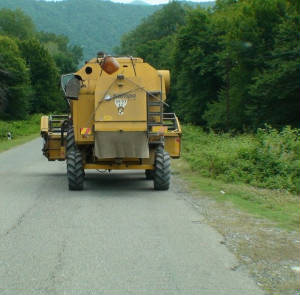 
My alternator stopped working soon after we left Sheki.
Since the car is diesel, the engine does not use much electricity. We turned off all electrical items and reached Baku
with plenty of battery power still available. So glad we are taking spare parts with us. Happen to have a new
spare alternator. Otherwise, would have had to have one shipped from the U.S. by air freight. Very costly.
The air conditioner broke down again outside Istanbul. The two front torque arms were bent during shipping and
are about to break. If not careful, the front wheels vibrate violently at 50 mph. Have ordered new parts
to come by Fedex (Quigley, the manufacturer, gave the parts for free once they learned of the $700 FedEx charge! Thanks
Tiger). FedEx takes about 5 days to reach Baku from U.S. - Ordered the parts last week. Have a bit of car repair to
do in Baku. On the way stopped at a restaurant for lunch. The owner listened to our attempt at ordering lunch, ignored
our order completely, and instead prepared a sumptuous feast of a lunch the like of which you would not believe! So
glad he did not listen to us!        
Beautiful
road at the green foothills of Caucasus mountains. Fresh snow-melt mountain streams irrigated orchards at the
mouth of the alluvial fan valleys. At every valley's "mouth" was another Wellness center resort.
Seemed very clean and nice. The places where tea and food was served, had a huge smoking Samovar on the side of
the road. Mostly agricultural land with orchards and pastures. Horses. Sheep. Cattle. 
On the way passed by this house! Now, I believe in building
codes and inspectors! Arrived in Baku Late in the afternoon. Took
a while to find the hotel. . . . . .
Baku By Kambiz Taleghani 20080726 Arrived in Baku from Sheki on Monday July 14th for what we thought would
be one or two-night stay. Little did we know at the time that
we would remain in Baku for 12 days, leading to abandonment of driving to China, and instead taking a completely different
route, which would take us through Iran, back to Turkey. Our unexpected stay here was mostly taken by mad rushes from
embassy to embassy trying to get new visas to replace our expiring ones. It also included constant telephone and email
messaging in an attempt to find transportation for our vehicle out of Central Asia (i.e. Almaty). If you want to read
the boring detail of our daily routine of chasing visas and trying to arrange transportation, click
here! If you want to read about what happened to us here and elsewhere as a result of Chinese cancellation
of driving permits, go to Story of Aborted Drive on this website, or click here! Baku is the Capital of the oil-rich Azerbaijan. Baku
is derived from the old Persian Bagavan, which translates to "City of God". It is a city of
contrasts. 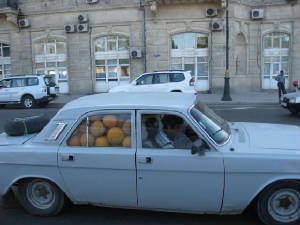 
In Baku, you can notice evidence of infusion of oil money everywhere.
Noticeable are: New fancy cars on bumpy inadequate roads. Construction everywhere. Inadequate public
services. New High-rise buildings in neighborhoods with narrow and winding streets. Not unusual for
the width of the street to change a few times along its course. Discarded refuse in some places.
Pollution. New luxury buildings near old Soviet-style dilapidated concrete blocks. Oil spills around the city.
No telephone directory (this amazed us! See the story of our 4-day quest to find the Turkmen embassy. www.gotochina08.com/id18.html ). Brand new BMW police cars for a force which had a reputation for
taking bribes as a supplementary means of financial support. Consumption. Public notices of contracts and tenders being announced
on all fronts. ...and then there is the beautiful Baku.  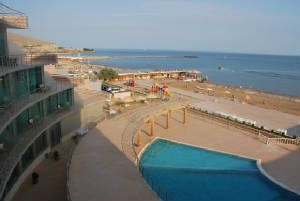
It has beautiful seafront neighborhoods. A large
and well-maintained park, called "Boulevard", between the sea and fancy shops across the street. Luxury high-rises
facing the park. Nice Yacht club. Many fancy shops and boutiques lining up seafront stores. High-end services
catering to the needs of the affluent. Modern buildings. Wide treed streets near the seashore. Luxury
hotels. Nice restaurants. Modern stadiums and public places. Baku
is also an ancient city. 100,000 years ago it was green with flora and fauna. Nearby petro glyphs date back to
over 30,000 years ago! Visited Mud Volcanoes south
of the City.  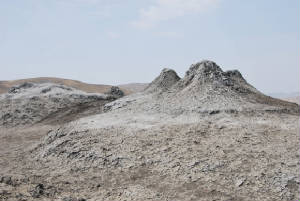 Azerbaijan boasts of having over 800 such mud volcanoes.
This is a natural phenomenon, where gas pushes and mud bubbles on top of a rising cone. In one area we visited (about
40 km south of Baku near the Petro Glyphs) multiple such cones had created a large hill over, it seems, the course of many
years. The mud felt cool to the touch. The largest cone we saw was about 3 meters (18 feet) high.
Visited the site of the petro glyphs about 40 km south of the
city. 
It is located on the mountainside. There is a lone building
with a few employees waiting for an occasional visitor. Walked the area with a guide. Very interesting.
Barely uncovered. See pictures. The stone carvings and "caves" provide insight into the lives of the early
inhabitants of the area. Evidence of Viking settlements on stone carvings' scenes. One interesting aspect of visiting attractions in Azerbaijan is the fee they collect for camera and video usage.
For use of our own picture camera, we had to pay about $5. For the use of our video camera, there was an
additional $16 per camcorder fee. If your camera is capable of taking both video and pictures, you must pay a
double fee. Azeris seem very sensitive to photography.
On numerous occasions, we were told to turn off our cameras in public and private places. Or, if you want to use
your camera, be ready to pay high "permission" fees. Very unusual for those of us who do not think twice about
taking a picture of interesting public place or scenery. I remember
in Sheki, during the visit to one of the palaces, an argument rose between our guide and the museum's guide because one
of the people in our group of visitors was "caught" taking a picture with his video camcorder! Poor
chap probably was not even aware or conscious of such "unusual" requirements. Apparently he had only been
charged for a video permission at the entrance! The museum guide would not let go of the subject. Kept repeating
the consequences of such intransigence! Baku is on the Caspian
Sea, the world's largest lake. It is a salt-water lake, below sea-level. This is the home of the
famous sturgeon fish where Beluga caviar comes from. Unfortunately, it seems, due to overfishing, oil, and industrial
dumping into Caspian, the sturgeon is expected to become extinct "within 15 years". What a shame.
Sturgeon is one of the rare, pre-historic fish which still exists in Caspian Sea. Visited the Maiden Tower in the City, next to many carpet stores (see pictures). 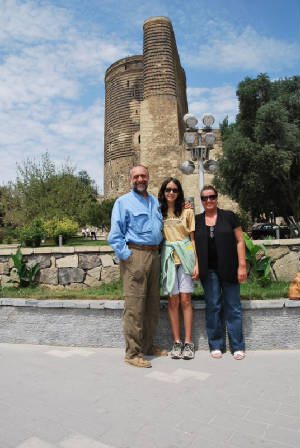 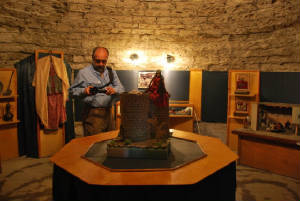
An imposing stone structure (fort/temple). Originally
built over 2000 years ago as a Zoroastrian temple, it was rebuilt in the 12th century. Originally on the
shore of the Caspian Sea, due to receding seawater and land reclamation in the early 20th century, the tower is now separated
from the Caspian by a busy main street and public gardens. Very interesting. Circular stairway from
second level up. On the 3rd level, there was access to a deep underground well which provided a source
of fresh water. Site of ritual fire, being fueled by the ever-present natural gas which was "piped"
into the structure. With enough food supplies, the defenders of the tower could close the gates, and sustain themselves
for months, with unlimited access to water and fire. Most information was about the structure itself. Hardy any
history of the function (Zoroastrian temple), the history, the people who built it, or rituals. Nice site, though. See
pictures. 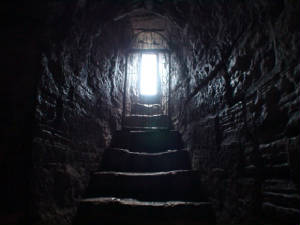 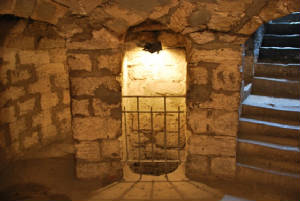
Lots of Iranian tourists come to Baku. Saw some at the Maiden
Tower. They, and many others, asked to take a picture together. They were thrilled that we are from the U.S.
Two of the people in the group actually came out and hugged and kissed us. Many Iranians are buying condominiums
and property here. Apparently last year when U.S. was talking about bombing Iran, many Iranian families escaped to Baku
and the hotels were running at capacity for a long time, according to taxi drivers! Visited Aatashgaah, another Zoroastrian site. Azer
means fire. Azerbaijan is the land of fire. (oil and gas-rich). Baku is derived from the old Persian
Bagavan, which translates to "City of God". This was a center of Zoroastrian religion, which keeps
fire as a holy symbol of good.  Aatashgah is a rebuilt Zoroastrian Temple. Aatashgah means the place of fire. (See pictures and video).
On the day of our visit, we were the only cars in the huge parking lot! Actually, there was one car with Australian
visitors who left as we arrived. Interesting compound rebuilt during 19th century by the Parsis of India
(Remnants of Persian Zoroastrians who escaped to India in the face of Arab invasion of Iran in the Seventh Century a.d.).
Very interesting set of structures. It is a square compound in the style of old caravansaries. Around the
compound there are multiple rooms for travelers, kitchen, prayer, storage, etc. There is a large central courtyard,
at the center of which is a covered structure with place for fire at its center. Only the structures remain. Unfortunately
there were neither any furnishings, nor priests or practitioners of the faith left to show the visitor aspects of their lives
and faith. Aatashgah is a rebuilt Zoroastrian Temple. Aatashgah means the place of fire. (See pictures and video).
On the day of our visit, we were the only cars in the huge parking lot! Actually, there was one car with Australian
visitors who left as we arrived. Interesting compound rebuilt during 19th century by the Parsis of India
(Remnants of Persian Zoroastrians who escaped to India in the face of Arab invasion of Iran in the Seventh Century a.d.).
Very interesting set of structures. It is a square compound in the style of old caravansaries. Around the
compound there are multiple rooms for travelers, kitchen, prayer, storage, etc. There is a large central courtyard,
at the center of which is a covered structure with place for fire at its center. Only the structures remain. Unfortunately
there were neither any furnishings, nor priests or practitioners of the faith left to show the visitor aspects of their lives
and faith.   This was the religion of Azerbaijan for many centuries.
Azerbaijan was considered the source of religious enlightenment for Zoroastrians. The government-paid guides had very
little knowledge about the center. (ditto Maiden Tower in downtown Baku's seafront). In fact, Leila and I knew more
about their past traditions than they did. They were extremely interested to learn and were asking us to tell
and show them what we knew - which was NOT much! At one place Leila showed them the ancient Persian pre-new
year ritual of jumping over fire and chanting "give me your red glow (strength), and take my yellowness (weakness) from
me." One of the guides said she had heard about this and pleaded with us to teach her the words. Incredible!
This was her past, her history, her tradition. She (and many others we met) had had almost no exposure to it.
We noticed the same in Sheki, Baku's Maiden Tower, during chats with Azeris, Petro-glyphs, etc. Never thought I could witness a "wipe-out" of a nation's collective memory first hand.
Amazing. In speaking with the Azeris, we noted an almost universal lack of knowledge about their own history and heritage.
Of course, any first-time impression is inevitably subject to errors and misunderstandings. This visitor's first-impression
is no exception. One has to live in a place for a long time to absorb, learn, and understand. 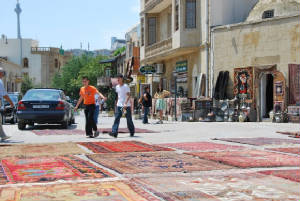 
We have some friends and relatives in Northern California (USA) whose
family of expatriates have setup a construction and housing development business in Baku. Oran's father was
taken ill. He and his wife had to fly-in for a few days. Due to some telephone and messaging snafus we missed each other.
It would have been a pleasant chance reunion, under unfortunate circumstances for them. Fortunately his father's
health improved and our friends flew back. We stayed in Ramada
Hotel in Baku, located at Shikhov beach south of the City. Very nice. 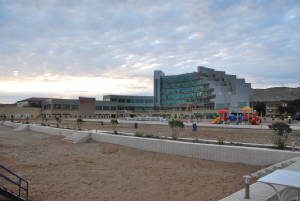 
Brand new. Business Center. Multiple restaurants.
Exercise room. Indoor and outdoor pools. Sauna and Turkish steam baths. Jet skis. One problem with
the beach was that the hotel dumped its sewage into the seawater at the beach. When we quietly enquired whether this
water really was sewage, the attendant looked bemused and said, yes "that is Azerbaijan for you". Amazing.
Still, people seemed to ignore it and crowded the beach. In both Azerbaijan and Iran we noticed a certain lack
of concern, or consciousness about environmental issues. Not as bad as Iran, though (See this website's tab for
"Iran - an unexpected visit"). 
Interesting scenes at the beach: on one hand,
completely covered women. On the other hand string bikins. All sharing the beach in complete comfort with eachother.
Interesting example of expression of freedom of choice. Met
families of expatriates at the hotel's pool. Leila became friends with Kimberly, a very sweet Scottish girl, whose
father works for the oil companies in Baku. The two spent every day at the pool near the beach!  
Many offshore oil platforms have replaced the flimsy-looking
"oil city" on stilts. 
. . Oil
Spring (not water!): Oil just seeps to the surface and flows as water does
in creeks! Slow as molases! . . . . . . . Leila and Adriana stopped at a rug merchant's shop and bought two beautiful Azeri carpets. Had left the car with mechanics for electrical and Air Conditioning repairs.
Finally after 6 days of delays, it was ready. Packed the Car.
It took 5 hours! Checked out of hotel. Said goodbye to new-found friends in Baku. Drove south
towards Lankaran, on our way to Iran. The people. Sometimes
rough, with big flashes of compassion! Will not forget the taxi driver who, upon learning that I could not buy a telephone
SIM chip without applying to authorities (i.e. security police), just stepped out of his car threw his credentials on the
counter, bought a SIM card in his own name, gave it to me, then said "let's go". He took quite a
risk. We had only known each other half-a-day during the quest to find the Turkmen Embassy. Of course, by that
time we had been chatting non-stop in the international language of throwing every word of every language you can muster,
in an attempt to communicate. Plus the hand gestures, of course! It actually works pretty well. Especially
after you calm down from laughing at each other's ridiculous linguistic mistakes!
Good bye my friend... and thank you.
Lankaran, Azerbaijan By Kambiz Taleghani 20080726 Left Baku in the afternoon, drove south, and slept the night in Lankaran, 60 km from Iranian border. A wide modern highway is under construction.  For us, however, it was a bumpy paved road. Most of the way we could not exceed 35 mph. Now
I know why everyone kept saying it takes 6-7 hours to travel 230 miles (300+ km)! Some roads in Azerbaijan are
SLOW! Although paved, they are so bumpy that you cannot exceed 35 mph without risk of damaging your vehicle's suspension. For us, however, it was a bumpy paved road. Most of the way we could not exceed 35 mph. Now
I know why everyone kept saying it takes 6-7 hours to travel 230 miles (300+ km)! Some roads in Azerbaijan are
SLOW! Although paved, they are so bumpy that you cannot exceed 35 mph without risk of damaging your vehicle's suspension. It was the fruit season. People, mostly, teenagers and children pick
blackberries from the bushes on the side of the road and sell them by buckets. Delicious. This is not the stuff
that is picked pink and turns red as it reaches markets. Those have no taste, in my humble opinion.
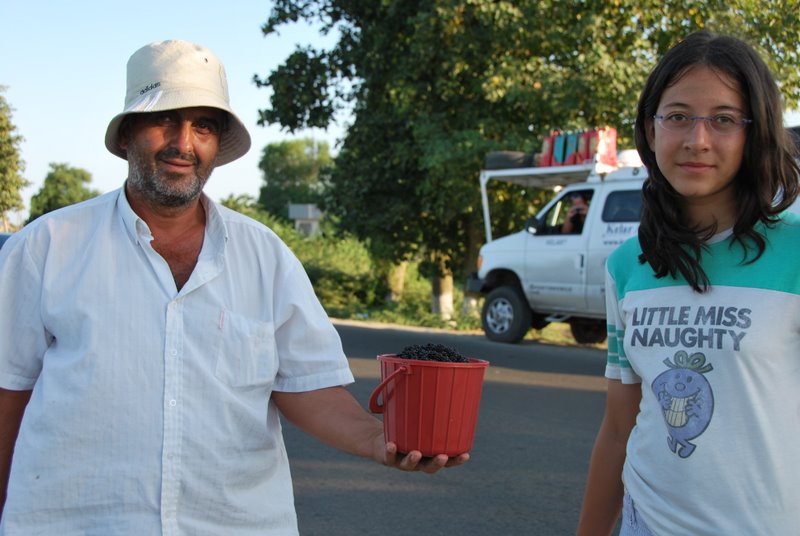
These blackberries however, ripen on the bush and, let
me tell you, it is SWEET and delicious. Always worried about stomach problems with unwashed fruit. Usually
didn't take chances. In general for most of the trip we washed all fruits with slightly bleached or
detergent water, peeled them with cleaned skins and knives. Or, washed the melons before cutting them with a clean
knife. .  Also saw some kids selling fresh-caught baby sturgeon fish. Compared to the giant 15-28 feet adults, these were
tiny babies of about 1½-2 feet in size. I heard later that Sturgeon is expected to become extinct
in about 15 years. Sad. These are pre-historic fish that have, somehow, survived for millions of years - until
now. How very unfortunate. Overfishing, Indurstrial waste, Oil and gas field development, lack of a single authority
(5 countries border Caspian Sea), an apparent lack of appreciation for preservation of species. They all contribute
to an absence of a collective will to save the Sturgeon and overcome the challenges of doing so. Also saw some kids selling fresh-caught baby sturgeon fish. Compared to the giant 15-28 feet adults, these were
tiny babies of about 1½-2 feet in size. I heard later that Sturgeon is expected to become extinct
in about 15 years. Sad. These are pre-historic fish that have, somehow, survived for millions of years - until
now. How very unfortunate. Overfishing, Indurstrial waste, Oil and gas field development, lack of a single authority
(5 countries border Caspian Sea), an apparent lack of appreciation for preservation of species. They all contribute
to an absence of a collective will to save the Sturgeon and overcome the challenges of doing so.
Lankaran is a tea-producing region of Azerbaijan. Very rainy and humid.  
We arrived late at night with no hotel reservation.
Hotel AB Qala which had been recommended was a nice 4-star hotel, but it was full. Nearby Olympic village (which
has really nice villas) was also full. We had tried to make reservation at Qala hotel, but like most establishment in
Azerbaijan finding their phone number was almost impossible. Like most other searches, we had been unable to find their correct
phone numbers from Baku. There are no phone directories in Azerbaijan. Internet listings have incorrect
numbers. The listings which we did find had incorrect numbers, and members of our Baku hotel (Ramada) could night find
Qala's number despite a few days of trying. The receptionist at Qala highly recommended his favourite hotel, which proved a
true dump! Perhaps a relative or maybe a commission from a friend was involved. He offered to call, and
I noticed that he mentioned the word "Xoreji" (foreigner) a few times, with a smile, during his conversation! Three
of them were salivating (sorry, waiting for us) on the sidewalk with huge smiles, bows, and welcome gestures. They wanted
$200 cash for a space with no door (at least, I don't remember a door)! I'd rather sleep in my car!
Eventually, through the help of taxi drivers, found Xazar (prounouned
Khazar, the other name for Caspian) hotel run by a family. Extremely nice and helpful owner/operator.
However, our room was one of the last ones left, and had no air conditioning (most other rooms did). It was hot
and extremely humid. Almost unbearable for Adriana. Leila was better. I kept quiet. Restaurants were closed. We found one open shop and bought some delicious
local bread, soft feta cheese, and a small water melon, and had a refreshing late snack, with the hotel setting up a plate
sets in our room. This is an area where Malaria still exists.
So, everyone rubbed themselves with mosquito-repellent and slept in our own cotton cocoon sheets which we had bought in U.S.
 Next morning Leila and I had one or two bites. The sheets proved too hot. We slept over them! Hope it won't
turn into Malaria. During days we wore special clothing that is impregnated with mosquito repellent material -
shirt, pants, and socks. Really interesting. They are quick-dry and supposed to retain their repellent quality
through 70 washes. You can locate these in most travel-related stores (in U.S., try REI or Adventure 16
Travel Outfitters). Next morning Leila and I had one or two bites. The sheets proved too hot. We slept over them! Hope it won't
turn into Malaria. During days we wore special clothing that is impregnated with mosquito repellent material -
shirt, pants, and socks. Really interesting. They are quick-dry and supposed to retain their repellent quality
through 70 washes. You can locate these in most travel-related stores (in U.S., try REI or Adventure 16
Travel Outfitters). Next morning while having breakfast in the
hotel's garden we noticed the owner's son brought a small plate of glowing charcoal with incense on top, and held
it for his father. The father waved the smoke towards himself and said a prayer. This is an ancient Zoroastrian
ritual! Azerbaijan was a center of Zoroastrianism until Islam came to the area and gradually replaced it. I was
dying to ask them what religion they practiced, but just could not bring myself to ask. Somehow, it did not feel appropriate.
I was so interested in the ritual, and asked if they could show us again. They were happy to do so for the camera.
Leila and I tried it. When we left, they gave us a present of the incense and a vase (a local Lankaran specialty).
(See note under Baku, above, for our similar experience at two former Zoroastrian temples).  
On Friday morning Drove to Aastaaraa, which is the border town
with Iran, about 60 km (38 miles) away.
Leaving
Azerbaijan... ... the drive to Iranian border.
By
Kambiz Taleghani 20080727 Left Lankaran on a Sunday (July 27th)
and headed for the Iranian border – a little nervous. Enroute, I filled all
five of our 5-gallon (20-litre) auxiliary tanks with diesel fuel. Then filled the main tank before
crossing the border. We had heard that there was shortage of diesel fuel in Iran. Although
Iran is among the top oil-producing nations, it does not have enough petroleum refining capacity and must import its fuels!
As a result extremely long fuel lines, black market for fuel, and intermittent rationing at petrol stations are common.
So, we filled our auxiliary tanks to give us some extra range (about 1300 km, or 900 miles). Many vineyards
near the border. Luscious green. Humid and hot. Beautiful nature.
Forested mountains on one side. Blue sea on the other. 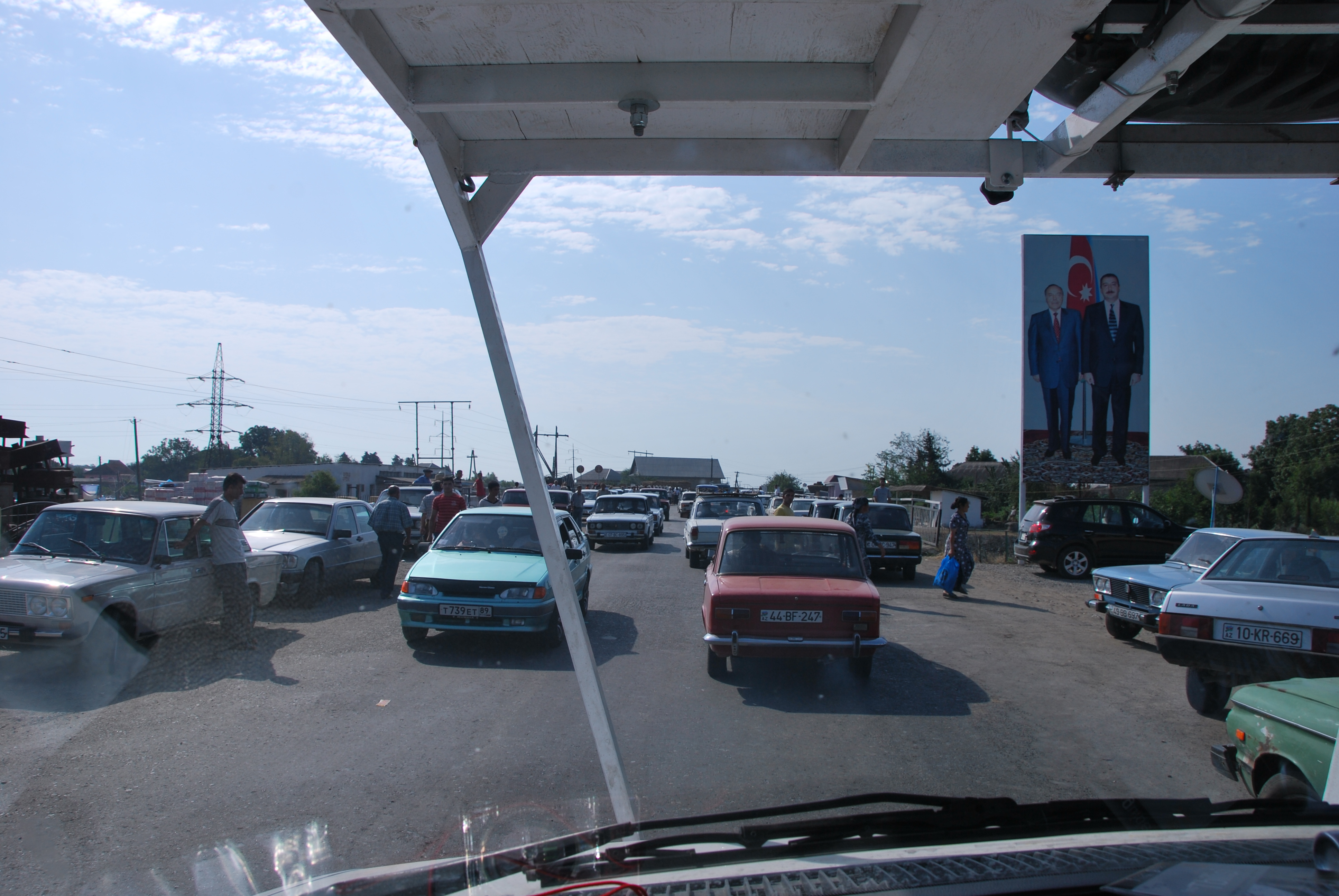 Leaving Azerbaijan was interesting. It took a while. First, we had to find
the border! (actually, the border crossing). All roads were paved until now. 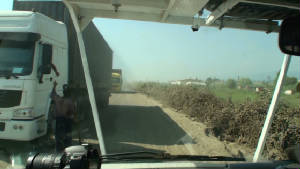 Then we kept going in circles in Astara looking for the actual border crossing. As it
turned out, the path is not paved. About 500-meter stretch of dirt/mud/sand path behind the
wind-blown ridge of the beach, abandoned to one old man with a shovel to try to fill the potholes. Truck
drivers would each pay this man a few notes to keep the ground passable. After driving a few hundred meters
on this stretch we reached a very large compound which represented the Azeri/Iranian border crossing. Long
line of trucks. Every bus and truck had to be inspected, including underneath. Then we kept going in circles in Astara looking for the actual border crossing. As it
turned out, the path is not paved. About 500-meter stretch of dirt/mud/sand path behind the
wind-blown ridge of the beach, abandoned to one old man with a shovel to try to fill the potholes. Truck
drivers would each pay this man a few notes to keep the ground passable. After driving a few hundred meters
on this stretch we reached a very large compound which represented the Azeri/Iranian border crossing. Long
line of trucks. Every bus and truck had to be inspected, including underneath. 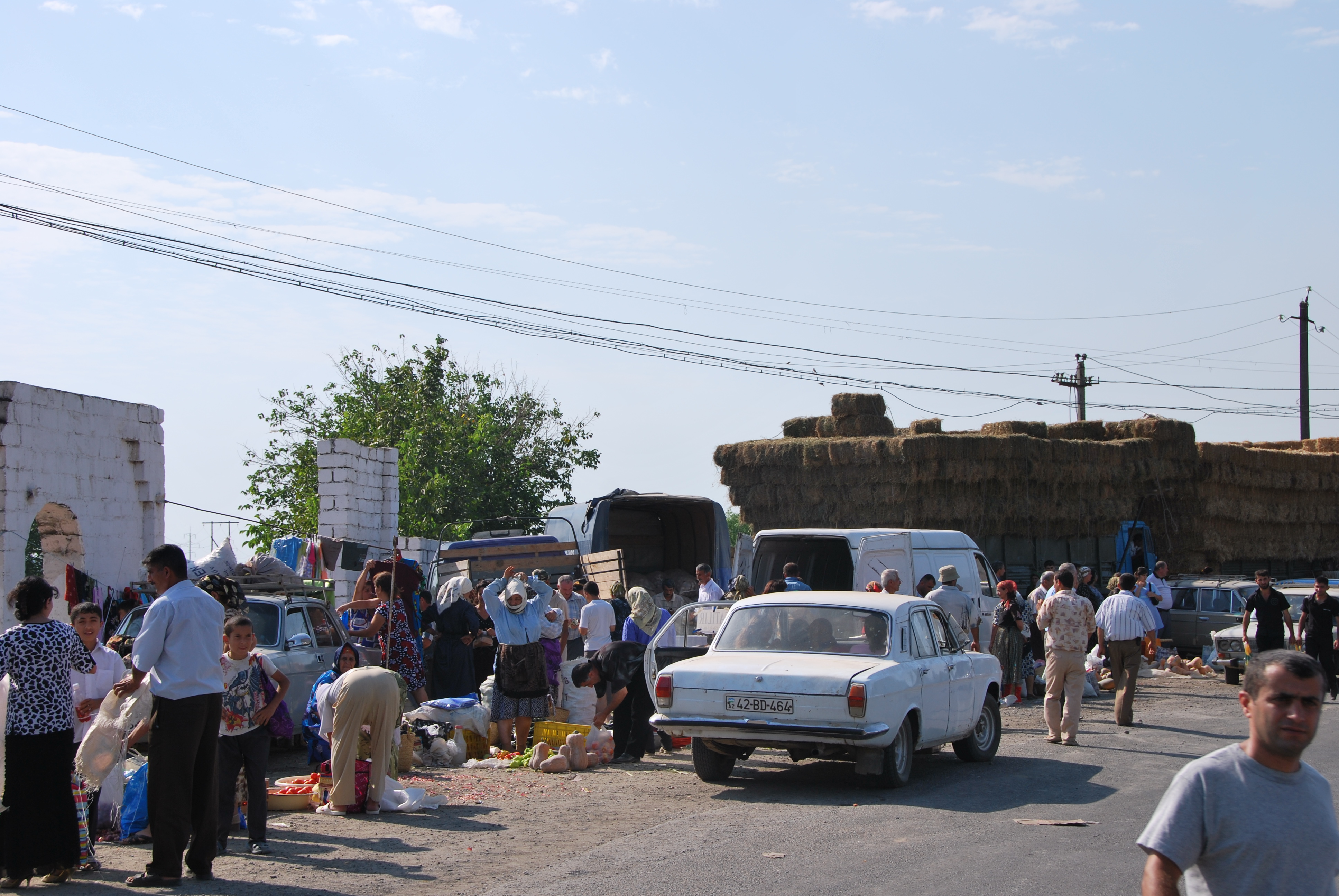 We entered the truck line. There was maybe one other passenger car. The
queue was 8-10 trucks wide. I walked to the front of the line and asked one of the drivers how long
since he entered the line. He said 10-p.m. the previous night. This was 10:00
a.m. the next day! He seemed resigned to the long wait. Got onto the left oncoming
lane during a short hiatus and started driving on the left side until we got to the front of the line. Apparently
there is a special place for passenger cars. After many questions and inter-departmental visits, approvals from Azeri
officials, and physical inspection of our car, we were allowed to leave Azerbaijan. 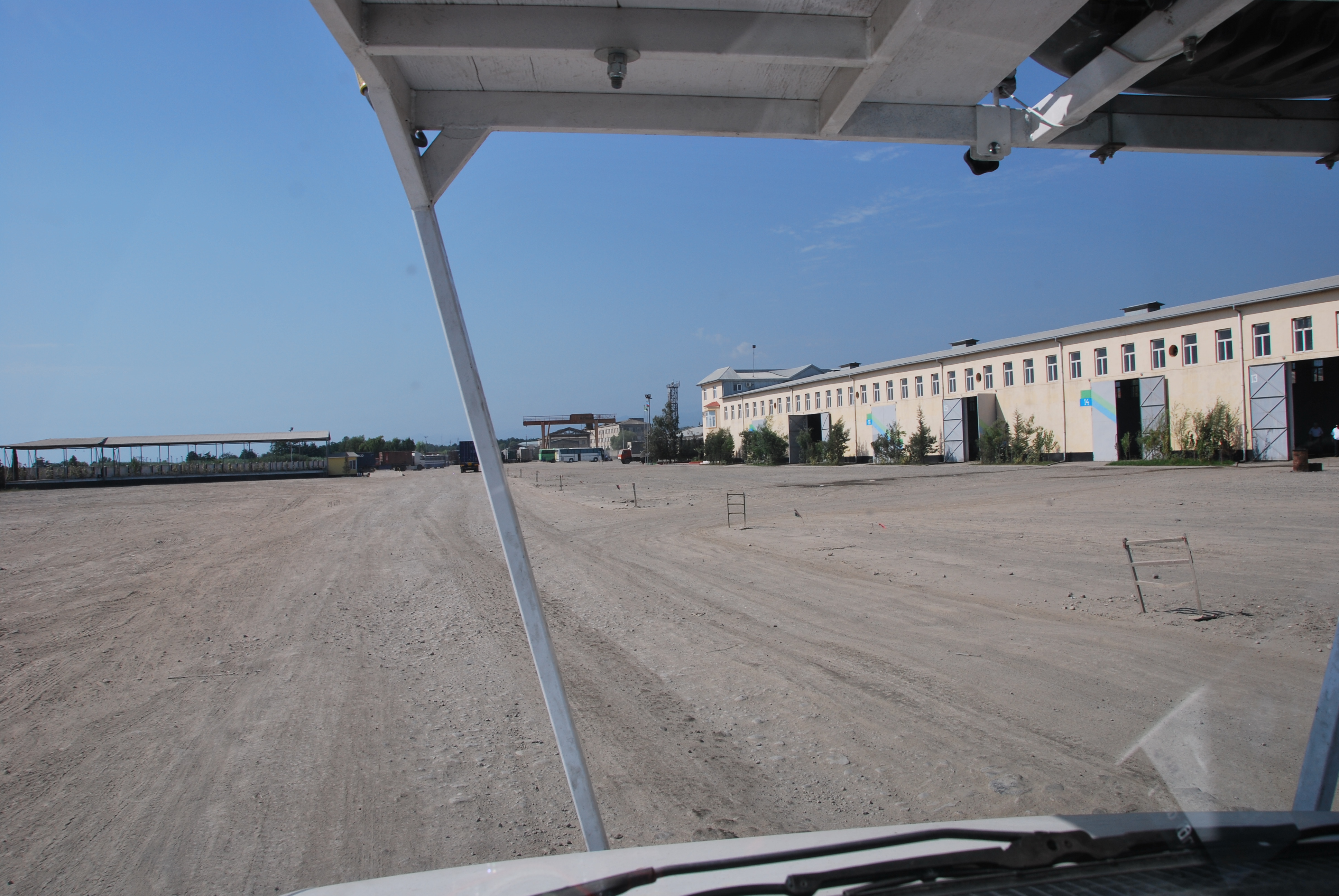
The last passport control consisted of two officers in a small hot shack.
They were actually worried about us and asked if we were sure about going to Iran. “Last
chance to change your mind, you know. If I put the exit stamp in your passport, you can’t come back
unless you go to Tehran or Tabriz to get a new Azeri visa”! They actually made me sit at a
chair and lectured about the perils of entering Iran with my wife and daughter! “It should
be okay”, sounding more confident than I felt. (I didn’t tell them that we had been told we could get an Azeri
visa on-the-spot at the airport, but when I went there, after having talked on the phone and having been assured that I could
get it in few minutes; the officer had looked in our passport and seen our Armenian visas… and immediately changed
his mind. He would not issue us a visa. Azeris and Armenian were
not friends during the summer of 2008!). After the last check, we drove about 50 meters to the actual gate, which
almost touches another gate belonging to Iran. Two Azeri soldiers slid the gate open and …
… we left Azerbaijan. … now to the Iranian side… … At
11:50 a.m. Sunday July 27th, 2008 the Iranian border gate ahead opened slowly, pushed by two Iranian guards, as
the Azeri gate closed behind us. (See the tab “Iran a surprise visit!” for our experience in Iran.)
|